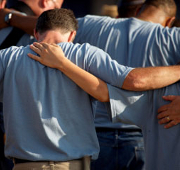Love Your Enemies
 When I was in a concentration camp during World War II,
When I was in a concentration camp during World War II,
we had to stand every day for two or three hours for roll call, often
in the icy-cold wind. Once a woman guard used these hours to
demonstrate her cruelty. I could hardly bear to see and hear what
happened in front of me.
Suddenly a skylark started to sing high in the sky. We
all looked up, and when I looked to the sky and listened to its song, I
looked still higher and thought of Psalm 103:11: “For as the heavens
are high above the earth, so great is His steadfast love toward those
who fear Him” (RSV).
Instantly I saw that this love of God was a greater
reality than the cruelty I experienced myself and saw around me. “Oh
the love of God, how deep and great, far deeper than man’s deepest
hate.”
In His mercy, God sent that skylark every day for three
weeks, just at the time of roll call, to give us an opportunity to turn
away our eyes from the cruelty of men to the ocean of His love.
God’s love is both a protection and a weapon. It guards us against impatience, against bitterness, against gloating. It is also a very strong weapon in the battle to win souls, for it never gives in.
It looks for a way of being constructive, it is glad when
truth prevails. Love knows no limit to its endurance, no end to its
trust, no fading of its hope: It can outlast anything. It is, in fact,
the one thing that stands when all else has fallen (see 1 Cor. 13).
How do we get that strong love? The Holy Spirit is the one who gives it to us (see Rom. 5:5).
We must look to Him particularly when we are faced with
the challenge of loving our enemies. Jesus commanded His disciples,
“‘Love your enemies, bless those who curse you, do good to those who
hate you, and pray for those who spitefully use you and persecute you’”
(Matt. 5:44, NKJV).
But this is impossible unless God Himself gives us the love that He demands from us.
In Africa I visited the cell of a young man who was
sentenced to death. His hands were chained, and his dark skin had many
red wounds, caused by lashes.
The cell was absolutely empty; only a plank on the floor,
and high up in the wall a very little window. The prisoner looked very
healthy and strong. The tragedy that this man had to die overwhelmed me.
I sat down beside him and prayed for a word from the
Lord. I asked, “Have you ever heard of the cross of Jesus Christ, where
He carried the sins of the whole world—also your sins?”
He nodded.
“Do you believe in Jesus Christ, that He will be your Saviour too?”
“Yes, I love Him, but I have not always been faithful.
Politics has taken up my time and attention completely, but now I have
brought all my sins to Jesus. He has forgiven me. If I should live any
longer, then I will serve Him with all my life.”
“Have you forgiven the people who have brought you here, who will have your death on their conscience?”
“No, I hate them.”
“I can understand that. I will tell you one of my experiences.
“During the war in Holland, I helped to save Jewish
people because Hitler wanted to kill them. One day a man came to me who
told me that his wife also helped the Jews and that now she had been
arrested.
‘She is in the police station and probably she will be
put to death. Now there is a policeman who is willing to let her escape
if we pay him 600 guilders, but I have no money.’
‘I can help you,’ I said. ‘Come back in an hour.’














































